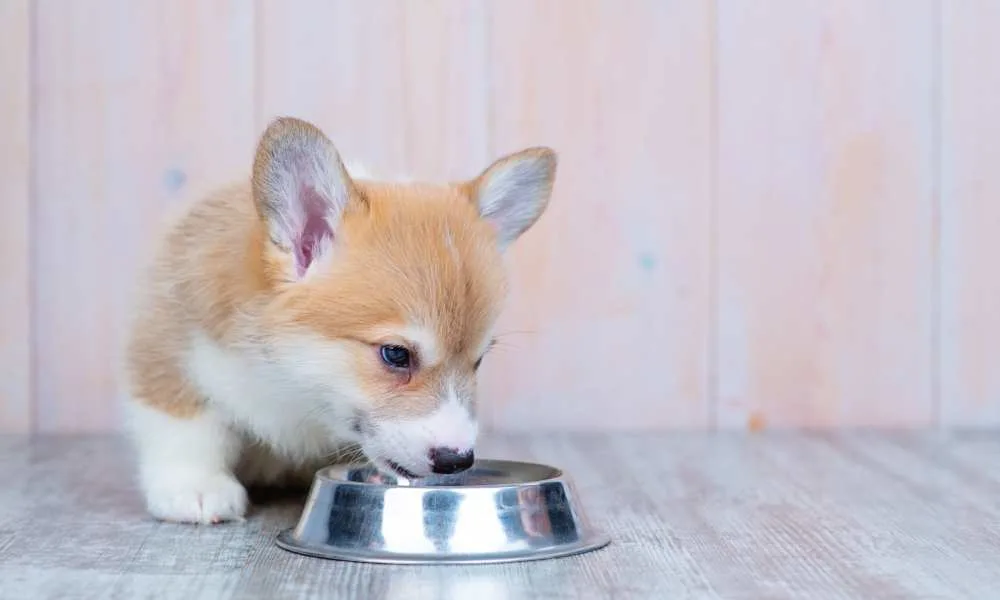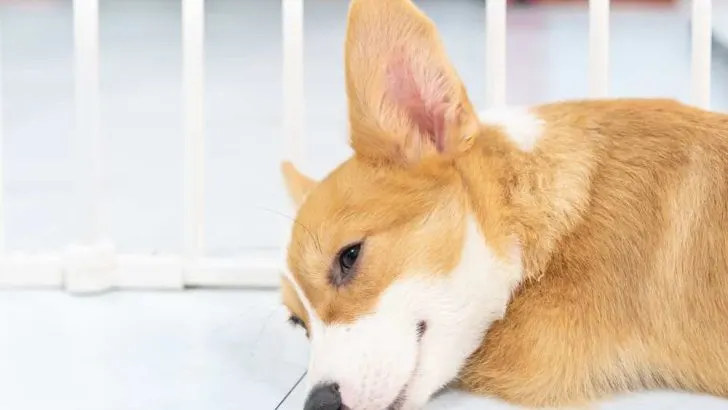Getting a new puppy can be a joy for the entire family. Getting to know your new furry baby and having a new friend to play with all the time is just the best!
However, having a dog is not all fun and games – it’s a real responsibility you signed up for. There are so many things you have to keep in mind when taking care of your Corgi.
Corgis need a lot of care, and if the Corgi is your first dog, it could be a bit challenging. A lot of things could make you worry endlessly. For example, if your Corgi is flatulent. You may ask yourself, why does my Corgi fart so much?
To find out all about Corgis and their flatulence, continue reading our article!

Do Corgis Fart?
Occasional gas and flatulence are completely normal and natural in humans. The truth is – everyone does it, even Corgis!
Your dog experiencing some gas from time to time may be an unpleasant experience – a smell one at that, but it’s completely normal. If your Corgi cuts one from time to time – it’s nothing to worry about!
All dogs get some gas from time to time – but some dog breeds experience more flatulence than others. These dog breeds would be pugs, boxers, and bulldogs. However, every dog breed can get some gas – even Corgis. Corgis don’t let out gas as often as the dog breeds mentioned above, but it can still happen.
Some Corgis may get more gas due to various factors. Many different factors could result in your dog becoming gassier. Is there a level of flatulence that could be concerning for your Corgi’s health? Well, some things could be a cause for concern, and we will cover them all in this article!
Do Corgis Fart A Lot?
Generally speaking, no. Corgis aren’t an especially flatulent breed, but they can get gassy as much as any other breed. There are a few different causes why your Corgi farts more often than usual.
In the next section we will discuss what causes farts in Corgis, and what can you do to help!

Why Does My Corgi Fart So Much?
As we previously mentioned, there are a few causes as to why your Corgi gets gas. The causes are usually the same as in humans. After your Corgi eats something, the bacteria in the intestines break down the food into essential nutrients to feed the body.
During the process of breaking down the food, digestion can produce a by-product called hydrogen sulfide, a gas. This gas smells bad – and it’s caused by processing certain food items in the colon. Since this gas becomes trapped in the colon – your dog needs to release it, so he farts.
What also happens is that some dog breeds tend to swallow lots of air when they eat. Some dogs swallow air because they eat too fast – but some do because they are brachycephalic breeds.
Brachycephalic breeds are pugs, Shih Tzus, and Boston terriers, and the term is used to describe dogs with short or flat faces. Just like the gas formed in the intestinal tract, this air is also released by farting.
Just because Corgis don’t fall in the category of brachycephalic breeds but they can get gas nonetheless. So, is it normal for Corgis to pass gas?
A bit of gas is perfectly normal, even if your Corgi farts every day. However, if you feel that the farts have gotten very smelly, something is surely up!
What’s more – if you notice that your dog has diarrhea or blood in his stool, that is a cause for concern. If you see that these problems persist, it might be best to visit the vet at your earliest convenience.
So, there are a few possible reasons why your dog has excessive gas. We will discuss the potential reasons below:
1. Eating Too Fast
Some dog breeds are generally speed-eaters, but even the most inconspicuous dog breeds can be guilty of gobbling up their meal. This is one of the most common reasons why your Corgi becomes flatulent.
Even humans are guilty of gobbling up their dinner, and it can easily result in flatulence. Why does speedy eating result in flatulence? This phenomenon is called aerophagia. When eating too fast, air enters during eating, and since it has to be released, it comes out as gas.
To make sure your dog isn’t eating too fast, you can try to put a tennis ball in the middle of the Corgi’s meal to slow him down. There are even some interactive dog bowls that can help your dog stay at pace when eating dinner.
2. Eating Scraps From The Table
Feeding your pup scraps off the table is never a good idea. Sure, children love throwing food off the table for the pup, because it means they can skip a meal they don’t like.
However, those habits are bad for your pup, because they can give your pup flatulence. Corgis tend to respond differently to humans foods. Most commonly, those foods are peas, dairy, soybeans, sugary foods, fruits, and spicy foods.
If eaten in tiny quantities, any of these food items is no big deal. Eating a bite of fruits or sugary foods is not likely to harm your pup. On the other hand, eating a full meal of spicy food can cause extreme flatulence in Corgis. Do note that these foods are just more likely to cause flatulence, but any food can cause flatulence. Either way, cut the habit of feeding your Corgi scraps, and instruct your children to stop as well.
Moreover, your dog could be eating food from the trash and getting gassy from that. Dogs don’t have the same feeling we do when we see food in the trash. Check if your Corgi has access to your trash can and if he does, he’s likely eating some food from there.
Try to replace the can with one he cannot open, or move the trash can to a place that is inaccessible to your Corgi. Your pup could also eat something that has spoiled and get food poisoning, which is much worse than flatulence or diarrhea!
3. Gastrointestinal Issues
Gastrointestinal issues can be caused by various diseases and syndromes. Most commonly, those are irritable bowel syndrome – IBS, inflammatory bowel disease, intestinal parasites, canine colitis, pancreatitis, and cancer.
This is precisely the reason why you need to visit the vet if your dog cuts one more often than usual. Some of these issues are easily resolvable, but they could be more serious – like cancer. Do note that your dog could be in a lot of pain from all that gas. So, it’s in your best interest, as well as the best interest of your dog to find out what is up with his health.
Treatment for any of these health conditions can help decrease the amount of gas collecting in your dog’s tummy. Also, another common thing that could be causing gastrointestinal issues is food allergies.
When To Be Concerned About The Corgi’s Farts?
We talked about the things that are cause for concern. If you do notice that the farts are getting smellier, or more frequent than usual, that can be a cause for concern.
Farts may be a sign of indigestion, but they could also be a symptom of more serious diseases. If the flatulence is followed by persistent diarrhea, or blood in the stool – visit the vet as soon as possible.

Food Allergies And Food Sensitivity
Dogs can get food allergies, just like humans – and food allergies are more common than one thinks. If you are worried that your pup may not be responding to some food well, consult the vet.
The vet may advise you to feed your Corgi a restricted diet for a while – to figure out what is the ingredient that causes so many tummy woes. Once you do figure out what is causing flatulence in your Corgi, eliminate that food item from their daily diet. In a day or two, you should see the results – or lack of gas.
Moreover, dogs can be rather sensitive when it comes to their tummies. Changing their diet suddenly or feeding them a completely different food brand could cause them some annoying tummy woes. You could be dealing with weeks of your Corgi’s flatulence. That is why it’s so important to start slow when it comes to new foods.
Transition very slowly by adding some new food into their regular dog food to make them used to it. The next day, you add some more of the new food, and a little less of the regular one. Do it this way for around a week to ten days, and you will help your pup adjust.
Since their tummy is already pretty used to the new food, you will avoid digestive issues like smelly gas or diarrhea. That is if it comes to the commercial dog food brands.
When it comes to treats like vegetables, or fish – you should take your time introducing that food item. Dogs can be put off by new foods – especially if those foods look nothing like meat. As if that is not bad enough – they can become flatulent if they eat too much of something they are not used to. That is why you should go with the introduction method – to prevent all the pesky and unpleasant symptoms!
Add a little of the new food into their regular meal. You can mix it in or sprinkle it on top – works either way. Then, you should take your time to see how your pup responds. If he seems happy as ever, you can add some more of the new food next time, and so on, and so on. Do this for around two to three weeks until you reach the full allowed portion. This way, your pup will not get so much gas!
Food Intolerance
Corgis can be intolerant to certain food items – and eating those can lead to digestive issues, diarrhea, and gas. For example – a Corgi being lactose intolerant means that he has issues digesting it. Generally, food intolerance is not the same as an allergy.
If the dog is allergic to something, the symptoms of allergies are usually not digestive. The dog is more likely to experience extreme itchiness, and a flaky, dull fur coat.
Although dairy is the most common food intolerance, Corgis can be intolerant to various other food items. Locating that food item may be no easy task, but it’s most likely carb-heavy fillers like wheat, soy, or corn.
These carb-heavy fillers are most likely to be found in cheaper, low-quality commercial dog foods. These fillers are also called “resistant starches” – because they can pass to the large bowel and lead to bacterial fermentation. There, they can cause gas!
Try to opt for some higher-quality dog food for your pup. It will be way easier to digest, and it will likely not contain something that could upset your dog’s digestive tract.
Food Additives
The carb fillers may cause gas – but that’s not the only cause for concern when it comes to ingredients in the commercial dog food. Some additives are suspicious, as they allegedly can cause tummy woes in Corgis.
Most commonly, that additive is a binding agent called carrageenan. This additive is usually found in wet, canned food – and is shown to cause IBD – inflammatory bowel disease in some test subjects.
This is more accepted in the holistic approach rather than the mainstream veterinary community. However, it’s worth investigating if you see that your pet’s gas persists although you changed everything else. Check if the Corgi’s wet food contains carrageenan. Some high-end commercial dog brands never include carrageenan in their prepared meals!

How To Stop Corgi’s Farts?
Well, there are a few things you can do to ease your Corgi’s tummy. The number-one is switching your dog’s diet. As we previously discussed, you should do that in-sync with a veterinarian, who will advise you on what steps to take. What’s more, remember to take it slowly!
Furthermore, plenty of activity after a meal can help your Corgi digest the food easier. Dogs that have plenty of exercises get less gas. Going for a brisk walk after dinner can boost the Corgi’s metabolism, and help you both sleep much better!
If nothing else works, you can try to ease your Corgi’s flatulence with probiotics and prebiotics. Make sure to discuss this with your vet first, and to use the supplements specifically intended for dog use. Many commercial foods are enriched with prebiotics and probiotics, so you can try that, as well.
If using supplements does not seem attractive to you, you can try to give your Corgi pureed pumpkin. Pumpkin soothes the tummy after diarrhea, as well!
See Also: Do Corgis Get Bloat? Are Corgis Prone To Bloat?

Bottom Line
To conclude, there are various reasons why your Corgi is having excessive gas. From a poor diet to health conditions, the reasons vary a lot. Usually, try to feed your Corgi a consistent, nutrient-rich diet and stop him from eating too fast. Good habits like avoiding scraps and food from the trash can help immensely.
However, if you do notice that the farts persist, consult the vet. The professional will examine your puppy thoroughly and see if there is an underlying condition that is upsetting your Corgi’s tummy!

